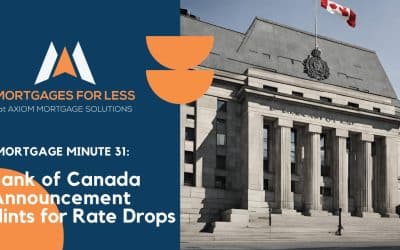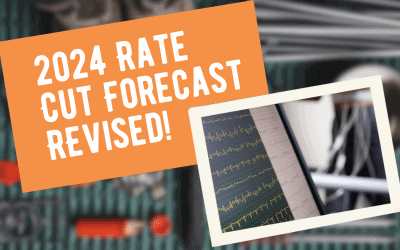Are We Coming To The End Of The Hard Road?
All signs pointing towards a future that is on the up-swing.
Are we finally in for some good news?
Our Take
According to the Bank of Canada the increased interest rates are having their desired effect. Inflation is slowing, as is the housing market in the hot markets of Vancouver and Toronto. We should be seeing interest rates returning to a pre-pandemic level in the next year. Now might be the time to snap up certain homes while the inventory is high, and the sales numbers are down. Watch to hear more.
Want to Talk?
Don’t worry we are always here to answer your questions. In this changing rate environment it is more important than ever to work with a qualified mortgage broker. Apply Now or use the form to schedule a call and we can walk you through your options and show you the best path forward.
Speak With An Agent
Bank of Canada’s latest rate hike lower than expected. 
While the Bank of Canada increased its interest rate again at the end of October, the increase was less than many anticipated. Is this signaling the end?
When the September inflation numbers came in a few weeks before the announcement, economists at the major banks all increased their expectation for the October 26th interest rate announcement. Until then the general consensus was that it would be a half percent increase, but once that data came out some were thinking it might be as high as a full percent! Thankfully that didnt happen and the rate increase remained at the half percent previously anticipated. As a result of this lower than expected increase, we immediately saw fixed rate mortgages drop about a quarter percent at several lenders.
I have been getting a lot of calls, emails, and text messages from concerned buyers and homeowners alike about these increases. A common question for current variable rate holder is “should I lock in now?” Some of you took a variable rate when rates were around 1.5% and have seen your rates increase all the way to 5%! That hurts and means a payment increase of just over 50%!
So this leads to the big three questions right now!
- Should I take a fixed rate now
- Are we actually seeing the end of this madness
- Is it smart to buy now as things are beginning to turn around.
Where the rate game gets difficult is that by the time we are looking to convert to a fixed rate, it is already too late and involves accepting an even higher rate than we are currently at. And we don’t know how much higher the variable rate will go.
For taking a fixed rate today, it really does depend on how much further rates will go. Most models suggest that the variable rate will cost less over the next five years than the fixed rate. If we put you into a variable rate that has stable payments, that can give a buffer against payment shock, while still providing the probable savings that a variable rate will provide in the back half of the mortgage term.
So, while I don’t have a functioning crystal ball, and I can’t predict the future, I can tell you that the Bank of Canada is softening it’s stance on further increases. Yes, there will be more, but perhaps not that many. It is starting to look like they will be much smaller increases going forward, and hopefully not more than one or two more. For example, as of today TD is still predicting only another quarter percent for the peak, but admits it could be as much as ¾ of a percent when they update their outlook.
Only a few weeks ago, CMHC shared their forecast with me, and it shows the same upper end as TD’s, with rates moderating in 2024 with rates settling about ¾ of a percent higher than they were in the period pre-covid. That would put variable rates around 3.5% when this is all done. Fixed rates will likely be similar.
Apart from inflation, the rising interest rates have already accomplished a lot of what they were intended to do.
In Canada’s largest markets of Toronto and Vancouver, home sales are down 49% and 46% respectively. Those were both overly hot markets and both were leaving the majority of non homeowners out of the real estate market.
We haven’t seen the same kind of decline in Alberta, and we didn’t see the same kind of crazy increase during COVID either. October sales in Calgary are down 15% from last year (or 2.3% month over month). In Edmonton, the most recent data I could get was September, but it saw a similar 15%
Now to compare against the crazy few months that we saw earlier this year, Edmonton saw sales peak at 3267 total sales in March, but by September that had returned to 1581 sales. So about half. This is clearly different than previous years where the September vs March sales are usually within 25% or each other. Average residential sale price peaked in Edmonton in April this year at $416,014, and is down to $375,061 in September representing about a 10% decline in those 5 months. However the last two months the prices and sales numbers were nearly flat, suggesting the decrease is largely done.
Calgary saw sales peak at 4091 in March, but by October this came down to 1857. A bit less than half, but only slightly less than the same month a year ago. Average residential sale price in Calgary peaked in February at $547,841, dropped to below $500,000 over the summer months, but increased up to $509,576 in October.
In both major Alberta markets, we are seeing signs of prices stabilizing from the peaks, and still above a year ago. We are seeing sales volumes stablize as well, and the current sales volumes are pretty typical.
The good news is that you can take your time buying and not worry too much about being outbid – something that was very common earlier in the year in Calgary.
Last week, Bank of Canada Governor Tiff Macklem met with the Senate committee on banking, commerce and the economy. He said “This tightening (rate increase) phase will draw to a close. We are getting closer, but we are not there yet.”
While the economy is still “overheated,” Macklem said that interest rate hikes to date are starting to have a moderating impact on growth. We see that most in the sectors of the economy that are most sensitive to interest rates, like housing and spending on “big-ticket” items such as vehicles.
The effects of higher rates do take time to spread more broadly through the economy. Unfortunately there is not an easy button to restore price stability and stop inflation or to rebalance demand and supply.
According to the Bank’s latest forecasts unveiled in its October Monetary Policy Report, the Bank expects headline inflation to average 6.9% in 2022 before falling to 4.1% in 2023 and 2.2% in 2024. All of these numbers are lower than a few of the year over year monthly numbers we have been seeing in the media, or experiencing at the grocery store.
The Bank expects a slowdown in economic growth in the coming quarters with GDP growth stalling – close to zero – over the coming quarters. Annualized the bank expects GDP to average 3.3% for this year as a whole, to reduce to just 0.9% in 2023, and then picking up to 2% in 2024.
It is a tricky line to balance! If they don’t do enough, then inflation will continue to be too high, and outpace wage increases. That will force even higher interest rates to combat, and likely a very severe recession. Nobody wants that!
On the flip side of they do too much, they will slow the economy more than needed which also has harmful consequences for people’s ability to service their debts, for their jobs and for their businesses.”
Things are difficult right now. Especially for those of us with higher debt loads, or those with variable interest rate mortgages that were below 2% only a few months ago.
But there is light at the end of the tunnel. We should see rates peak in the coming months. The rate announcement on December 7th will hopefully be only a quarter percent, and if the stars align it may be the final increase.
So, to summarize:
1 The Bank of Canada tells us that interest rate increases are nearly over.
2 We can reasonably expect inflation to calm down over the coming year
3 We could start seeing interest rate decreases in a year
If you have equity in your home but need access to some money to help through this difficult time, we should talk! We may have some short term liquidity options for you.
If you are considering purchasing a home in the next year, we should talk! See if we can get you in before prices start to increase again.
If you have an upcoming mortgage renewal, we should also talk. Let’s talk a strategy as more data comes out to take advantage of the slower real estate market, but also position yourself to take advantage of the rate decreases we expect to see in the coming two years!
My team and I look forward to hearing from you!
Meet The Author
Josh Tagg started his career as a mortgage broker in 2006. During his award-winning career, he has helped thousands of individuals and families secure mortgages for their homes.

Josh Tagg
Owner, Mortgages For Less




0 Comments